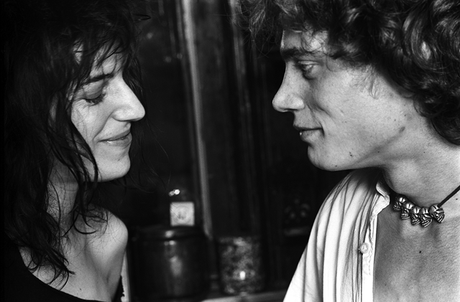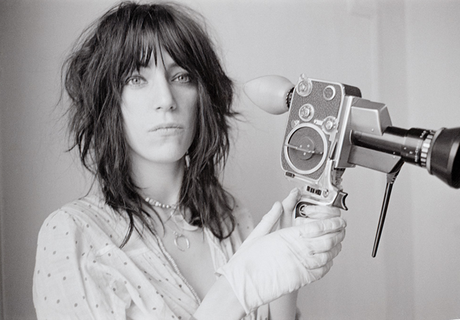 Reading Just Kids opened a window into my soul I didn't realize was there. Or rather, I realized it was there, I simply just forgot about it. This memoir by Patti Smith is haunting, poetic and captivating. She truly has a gift for the written word.
Reading Just Kids opened a window into my soul I didn't realize was there. Or rather, I realized it was there, I simply just forgot about it. This memoir by Patti Smith is haunting, poetic and captivating. She truly has a gift for the written word.It starts with painting the scene of her childhood and moves along to how she met Robert Mapplethorpe, her undeniable soul mate. They truly were just kids who found one another in the harsh world and reality that is New York City. Together they starved, scrimped and nursed one another back to health—physically, intellectually, spiritually, and emotionally.
I guess what I love about this book so much is that she doesn't sugarcoat the horrifically low points (such as trench mouth and being homeless), but somehow they flow out of her with the softness of whipped cream. Her heart and soul are in the ink and words on each and every page.
Below I have gathered some discussion and review questions from around the web, and I am taking the liberty of answering them myself this time around. Just promise me you will read this book if memoirs and the 60s are your cup of tea, alright? And mark your calendars for the release of her second memoir, M Train. I cannot wait.

1. Were you somewhat familiar with Patti and Robert before reading this book? Have you heard her songs/seen his artwork/photography? If so, how did this book change your idea of them?
I was briefly familiar with Patti's music, but I had no idea who Robert was before reading this book. Finding new artists always excites me, especially from this era, and it truly was a treat to research the pieces and put a face with a name. Somehow it brought the story of their love and relationship to life on a more realistic level.
2. This is a love story, but Robert is bisexual. How is this a traditional relationship? How is it a very unusual one? Did Patti sacrifice her happiness for Robert?
Bottom line, they loved each other for who they were. This wasn't about sexual orientation and stupid labels. Their love was about two souls finding one another and connecting in a way that only true love can. Sure, it was unusual and unhealthy at times when they weren't openly communicating their honest feelings. However, every relationship has those pitfalls. And no, I don't think Patti sacrificed her happiness for Robert. She lived her life and found her passions together and apart from Robert.
3. Both Patti and Robert became extremely successful in their lives. What drove them to their success? Was luck involved? Is it unusual for people so young to be so driven and confident?
Honestly, I think a lot of it was opportunity. They happened to be in the right place at the right time, and they knew the right people. Perhaps you could call that luck, but I think it is more fate than anything. We are all dealt a certain hand of cards in this life and you need to know how to play them. Patti and Robert knew what they had and went all in. Of course it wouldn't have happened without the hard work and confidence, but they had it all going for them.
What I noticed was that Robert was the one with the confidence. He wasn't afraid of networking and tirelessly self-promoting, which is essential to success. Patti was the more quiet reserved type, but she was smart and had a good work ethic. They were a great team in that regard, and I think the innocence and naivety of their youth worked in their favor. I wonder what their success would be like now if they were living in this day of social media. It's always interesting to me to read the stories of how young people achieve success.
4. How did a lack of money and resources play into their lives? Would having money at a young age (perhaps getting it from their parents, etc.) have ultimately robbed them of the experiences that shaped who they became? Does being handed things dissuade creativity and drive? What does this say about today’s youth?
Their poverty was an essential marker on their path to fame. If they had money they would have never landed at the Chelsea Hotel, which in my opinion was when they hit the jackpot. They struck gold living there. This is the time when Robert had trench mouth from being so malnourished and having a lack of proper hygiene, along with other diseases. The Chelsea was their one and only option really. If they had the money to bankroll their carefree youth, this story would have played out more like an Edie Sedgwick situation—too much partying without any real responsibilities to hold them accountable, leading to exacerbated mental illness and ultimately suicide or an overdose. Okay, maybe that's a bit of a melodramatic generalization, but you get the point.
I wouldn't necessarily say being handed everything can dissuade creativity or drive either, though. A lot of youth who have money are the ones who are "creatives" and "artists" living in ridiculously priced lofts in Brooklyn and San Francisco. And many of them become successful in their trade because of their talent in addition to the money and connections. But, I think a lot has to do with the parents and how much of an example or expectation they give to their kids about developing a good work ethic. Today's youth I would say are generally spoiled and we live in an era of immediate gratification. But, there are still innovators and thinkers, and they are the ones who will build the future, not the lazy, entitled bums.
5. Some readers might feel Mapplethorpe ‘took’ too much from Smith emotionally—that he leaned on her, perhaps even ‘used’ her at times—and that the relationship was unequal. Smith doesn’t seem to feel that way herself in this memoir. Why do you think she doesn’t?
As I mentioned above, I think she was completely aware of the situation and liked being needed. But she wasn't stupid and realized when it was time to move on. And she had plenty of moments where she leaned on him for emotional support. Robert was simply the moody artist. It has been shown in studies that "creative" types have a harder time closing off the flood-gates of stimuli coming into the brain and experience more mood and mental disorders. So, of course there is going to be a lot of stress and undulating emotions. Not to mention being hangry all the time. Hanger is real, people. Sheds some new light on the term "starving artist" doesn't it? Maybe all they need is a sandwich.
6. When do you think Robert became aware of his sexuality?
I think he always knew about his sexuality. Robert was raised in a very strict Catholic household, which frowns upon homosexuality, so I think he tried to push it away as much as possible until he finally felt free to be himself. Fleeing to New York was the independence he needed to truly find his identity (or try a few on for size until he felt comfortable in who he was).
7. Is New York responsible for their success in a way? Imagine if they had met and lived in St. Louis, for example?
This book would not exist if they had never landed in New York. As mentioned above, they fell into the right circle of artists and piggy-backed on the Warhol movement. The Chelsea Hotel was their goldmine and allowed them to become a part of that fold. We are talking Andy Warhol, Jimmy Hendrix, Janis Joplin, Jack Kerouac, Allen Ginsberg, Loulou de la Falaise, etc. Any influential artist of the 60s and 70s you can think of they most likely knew, and ran in the same crowd.
8. Amongst readers and reviewers there seems to be a difference of opinion regarding Smith’s name-dropping. Some find her mentions of famous artists of the day pointless. Some admire that she kept the name-dropping to a minimum given the social scene she was a part of. Did you recognize most of the artists she mentions? Would you have liked Smith to delve into more detail about those scene-makers?
I keep a small moleskin notebook to jot down names of people, works of literature and passages that stick out to me in the books I read. I literally filled over three pages just from all of the references Patti Smith made to poets, writers, musicians and artists. Sure, I guess she name dropped a little, but that was her life and her experience. I think it's wonderful she shared it. It illustrates the scene for us in an understandable way.
9. How did knowing that Robert dies of AIDS at an early age shape your reading experience? Was there a tragic vein that ran throug the story knowing that he would die young?
Tragedy makes for great storytelling. And Patti is indeed a gifted storyteller, so I think it was an essential part of her memoir. Their love had a classical element to it, in that it was heart-wrenching, beautiful, and profoundly humanizing.
P.S. This month's book selection is The Alchemist by Paulo Coelho. I've already finished it and it is a life changer, as in you must read it.
Discussion questions from here and here. Photos via here and here.

